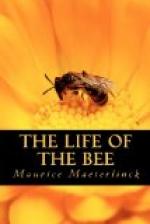When the queen has become completely sterile, the bees will rear a certain number of royal princesses to fill her place. But what becomes of the old sovereign? As to this we have no precise knowledge; but it has happened, at times, that apiarists have found a magnificent queen, in the flower of her age, on the central comb of the hive; and in some obscure corner, right at the back, the gaunt, decrepit “old mistress,” as they call her in Normandy. In such cases it would seem that the bees have to exercise the greatest care to protect her from the hatred of the vigorous rival who longs for her death; for queen hates queen so fiercely that two who might happen to be under the same roof would immediately fly at each other. It would be pleasant to believe that the bees are thus providing their ancient sovereign with a humble shelter in a remote corner of the city, where she may end her days in peace. Here again we touch one of the thousand enigmas of the waxen city; and it is once more proved to us that the habits and the policy of the bees are by no means narrow, or rigidly predetermined; and that their actions have motives far more complex than we are inclined to suppose.
[32]
But we are constantly tampering with what they must regard as immovable laws of nature; constantly placing the bees in a position that may be compared to that in which we should ourselves be placed were the laws of space and gravity, of light and heat, to be suddenly suppressed around us. What are the bees to do when we, by force or by fraud, introduce a second queen into the city? It is probable that, in a state of nature, thanks to the sentinels at the gate, such an event has never occurred since they first came into the world. But this prodigious conjuncture does not scatter their wits; they still contrive to reconcile the two principles that they appear to regard in the light of divine commands. The first is that of unique maternity, never infringed except in the case of sterility in the reigning queen, and even then only very exceptionally; the second is more curious still, and, although never transgressed, susceptible of what may almost be termed a Judaic evasion. It is the law that invests the person of a queen, whoever she be, with a sort of inviolability. It would be a simple matter for the bees to pierce the intruder with their myriad envenomed stings; she would die on the spot, and they would merely have to remove the corpse from the hive. But though this sting is always held ready to strike, though they make constant use of it in their fights among themselves,_ they will never draw it against a queen;_ nor will a queen ever draw hers on a man, an animal, or an ordinary bee. She will never unsheath her royal weapon—curved, in scimeter fashion, instead of being straight, like that of the ordinary bee—save only in the case of her doing battle with an equal: in other words, with a sister queen.
No bee, it would seem, dare take on herself the horror of direct and bloody regicide. Whenever, therefore, the good order and prosperity of the republic appear to demand that a queen shall die, they endeavour to give to her death some semblance of natural decease, and by infinite subdivision of the crime, to render it almost anonymous.




